

We have to recycle water on a massive scale – this is how we can. Damon Winter/NYT/Redux/eyevine By Sally Adee ZIKA isn’t the only thing hanging over the Rio Olympics.
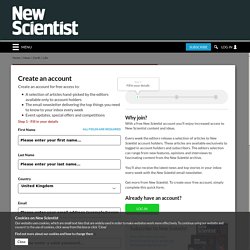
The city’s water problems are so intractable that swimmers have been told to keep their mouths closed so that they don’t ingest sewage. The situation is an important consequence of the shoddy way we all treat our water. Beyond Rio, evidence of our disregard for the wet stuff is all around, and it is starting to bite. In Connecticut, nuclear power plants have shut down for lack of water to cool the furious reactions inside, and coal power stations in India have shut due to droughts. We can avoid a water crisis, but the fix will be hard to swallow. Chris De Bode/Panos Pictures By Sean O'Neill You came up with the idea of the water footprint.
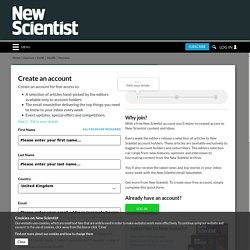
What is it? The water footprint is the total volume of fresh water used in the making of products such as food, clothing or energy. People also have personal water footprints, because we consume these products and of course use water in our homes. Why is this something we need to measure? Geoengineering our way out of the climate mess. WHO’S afraid of big engineering?
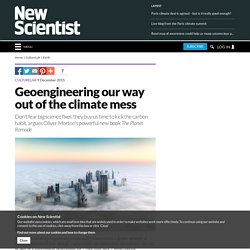
Apparently, there exists a global network of activists convinced that aircraft vapour trails are substances sprayed into the air as part of a government programme for – take your pick – mind control, sterilisation or climate management. All those in this network, and many outside, fear Promethean science. And geoengineering – the idea that we should alter the climate to our advantage while there’s still food in the shops and our coastal cities are above sea level – is certainly Promethean. It is, however, anything but the darling of the military-industrial complex. Its researchers are poorly funded enthusiasts, many of them close to retirement. Plastic-eating worms may offer solution to mounting waste, researchers discover. Consider the plastic foam cup.
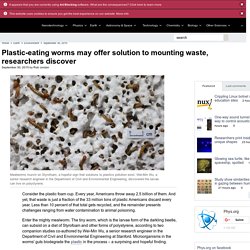
Every year, Americans throw away 2.5 billion of them. And yet, that waste is just a fraction of the 33 million tons of plastic Americans discard every year. Less than 10 percent of that total gets recycled, and the remainder presents challenges ranging from water contamination to animal poisoning. Enter the mighty mealworm. Palm oil: How this eco villain is mending its ways. Seal fur and Arctic bacteria leach toxic mercury into waters. A big fat source of mercury (Image: Dr.
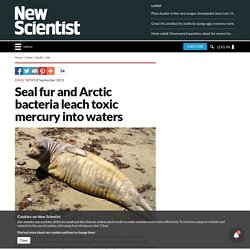
Priya Ganguli) Heavy metal is moving in mysterious ways. Two studies this week show that pristine areas, far from industrial pollution, are building up surprisingly high levels of mercury from unexpected sources – moulting elephant seals and bacteria in Arctic estuaries. Heat-tolerant genes could help corals adapt to climate change. CORAL reefs have a bit of fight in them.
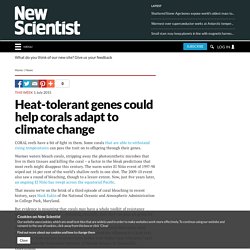
Some corals that are able to withstand rising temperatures can pass the trait on to offspring through their genes. Warmer waters bleach corals, stripping away the photosynthetic microbes that live in their tissues and killing the coral – a factor in the bleak predictions that most reefs might disappear this century. The warm water El Niño event of 1997-98 wiped out 16 per cent of the world’s shallow reefs in one shot. The 2009-10 event also saw a round of bleaching, though to a lesser extent. Now, just five years later, an ongoing El Niño has swept across the equatorial Pacific. That means we’re on the brink of a third episode of coral bleaching in recent history, says Mark Eakin of the National Oceanic and Atmospheric Administration in College Park, Maryland. Meals ready to eat: Expedition 44 crew members sample leafy greens grown on space station. Fresh food grown in the microgravity environment of space officially is on the menu for the first time for NASA astronauts on the International Space Station.
Expedition 44 crew members, including NASA's one-year astronaut Scott Kelly, are ready to sample the fruits of their labor after harvesting a crop of "Outredgeous" red romaine lettuce Monday, Aug. 10, from the Veggie plant growth system on the nation's orbiting laboratory. The astronauts will clean the leafy greens with citric acid-based, food safe sanitizing wipes before consuming them. They will eat half of the space bounty, setting aside the other half to be packaged and frozen on the station until it can be returned to Earth for scientific analysis.
NASA's plant experiment, called Veg-01, is being used to study the in-orbit function and performance of the plant growth facility and its rooting "pillows," which contain the seeds. The Veggie system was developed by Orbital Technologies Corp. Getting $15,000 a month from an old shipping containter - Jun. 24, 2015. But Shawn Cooney may have found the greenest use yet -- literally.

On a vacant lot near Boston's Logan Airport, Cooney is using four former freight containers -- plus one at another location -- to grow some 30,000 heads of lettuce, herbs and other leafy greens. "I'm not really a farmer," said the 61-year-old Cooney, who ran software companies before starting Corner Stalk farms in 2013. "But it's more interesting than a desk job. " If 30,000 heads of lettuce sounds like a lot, it is -- and it's the reason why he's able to run a successful farm in one of the country's most expensive cities. This solar powered floating farm can produce 20 tons of vegetables every day. From design practice, Forward Thinking Architecture, come a set of modular floating farms that harvest sunlight and rainwater, as well as desalinate saltwater and grow thousands of tons of vegetables ever year.

Inspired by Chinese floating fish farms, these rectangular units measure 200x350 meters and can connect with other modules via walkways. The usage of waterways is a great compliment to the farming industry because it makes farming available in so many more locations. It reduces the need to import food by localizing growth and incorporates rivers and lakes as viable "farmland. " Clucking hell: The nightmare world without chickens - life - 19 March 2015.
Do we take chickens for granted?
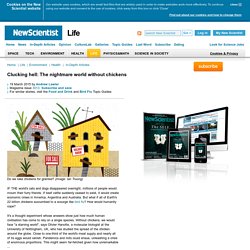
(Image: lan Truong) IF THE world's cats and dogs disappeared overnight, millions of people would mourn their furry friends. If beef cattle suddenly ceased to exist, it would create economic crises in America, Argentina and Australia. But what if all of Earth's 22 billion chickens succumbed to a scourge like bird flu?
How would humanity cope? It's a thought experiment whose answers show just how much human civilisation has come to rely on a single species. Tapping the weirdness of water to get enough to drink - opinion - 02 April 2015. I AM fascinated by water.

We can all agree that a liquid that occupies 70 per cent of Earth's surface and two-thirds of our body is very important. However, when I tell friends and family that I have dedicated 15 years of my life to studying water, they look at me with pity. Don't we already know everything about water? Then they suggest that, as a physicist, I should be studying something less common, such as carbon nanotubes. It is a mistake to underestimate water. Tapping the weirdness of water to get enough to drink - opinion - 02 April 2015. I AM fascinated by water. We can all agree that a liquid that occupies 70 per cent of Earth's surface and two-thirds of our body is very important. However, when I tell friends and family that I have dedicated 15 years of my life to studying water, they look at me with pity.
Don't we already know everything about water? Elemental risk: Securing the raw stuff of modern life - environment - 11 February 2015. (Image: Shutterstock) Your phone, TV and light bulbs would be duds without a host of hard-to-find elements you've probably never heard of. Should you be worried? YOU may have read about it here. Asteroid soil could fertilise farms in space - space - 16 December 2014. Read full article Continue reading page |1|2 We can now grow plants in microgravity – and crops grown in asteroid soil could sustain vast human populations off-planet IF YOU want to start a space farm, head for an asteroid. It seems there's enough fertiliser zipping around the solar system to grow veg for generations of space colonisers – and researchers are already beginning to grow viable, edible plants in space. Asteroids are a hot topic with the 3 December launch of Japan's Hayabusa 2 spacecraft, which aims to return a sample from carbon-rich asteroid 1999 JU3.
"Longer human missions will require the company of plants, in terms of providing both food and psychological comfort," says Bratislav Stankovic at the University of Information Science and Technology in Ohrid, Macedonia. Space farmers have had a tough row to hoe. "It appears to influence cell biochemistry," says Stankovic. Not only did the plants produce seeds, but 92 per cent then germinated successfully. Pantry Pests Harbor Plastic-Chomping Bacteria. Polyethylene is one of the most popular and, unfortunately, persistent types of plastics. Bags, bottles, and packaging made from the polymer accumulate in landfills and oceans across the globe. Scientists lament that microbes can’t chew up the plastic to render it harmless. Climate change caused by ocean, not just atmosphere, study finds. Most of the concerns about climate change have focused on the amount of greenhouse gases that have been released into the atmosphere.
But in a new study published in Science, a group of Rutgers researchers have found that circulation of the ocean plays an equally important role in regulating the earth's climate. In their study, the researchers say the major cooling of Earth and continental ice build-up in the Northern Hemisphere 2.7 million years ago coincided with a shift in the circulation of the ocean – which pulls in heat and carbon dioxide in the Atlantic and moves them through the deep ocean from north to south until it's released in the Pacific. The ocean conveyor system, Rutgers scientists believe, changed at the same time as a major expansion in the volume of the glaciers in the northern hemisphere as well as a substantial fall in sea levels.
It was the Antarctic ice, they argue, that cut off heat exchange at the ocean's surface and forced it into deep water. OPEC Split as Oil Prices Fall Sharply. Should we upgrade photosynthesis and grow supercrops? - opinion - 06 October 2014. This plastic is made from thin air - Video - Technology - Innovation Nation. Historic Abundance of Blue Whales Returns in California. Empty Japanese factories converted into high-tech farms. When Plants Get Metal: Part 2. Pure Genius: How Dean Kamen’s Invention Could Bring Clean Water To Millions. By Tom Foster At first glance, the bright red shipping container that sits by the side of the road in a slum outside Johannesburg doesn’t look like something that could transform hundreds of lives. Two sliding doors open to reveal a small shop counter, behind which sit rows of canned food, toilet paper, cooking oil, and first-aid supplies. Solar panels on the roof power wireless Internet and a television, for the occasional soccer game. And two faucets dispense free purified drinking water to anyone who wants it.
Biofuels Might Hold Back Progress Combating Climate Change. The U.N. Intergovernmental Panel on Climate Change has for the first time acknowledged the risks of uncontrolled biofuels development, a skepticism that has slowly emerged into the mainstream scientific community, say academics. IPCC's Working Group II report, released this morning in Yokohama, Japan, indicates that the U.N. scientific body on climate change has loosened its 2007 position that defines biofuels as a mitigation strategy for reducing greenhouse gas emissions. Six legs tasty: First edible insect farm opens in US - life - 23 May 2014. Read full article. How climate change will affect where you live - environment - 31 March 2014. World must adapt to unknown climate future, says IPCC - environment - 31 March 2014.
Read full article. Antarctic Glacier Thinned As Rapidly in the Past. Cryptic river: The torrents that flow on the seabed - environment - 24 February 2014. Antarctic Glacier Thinned As Rapidly in the Past. How the Spreading Symptoms of Climate Change Can be Deadly. Plastic made from pollution hits U.S. market. Human meddling will spur the evolution of new species - opinion - 17 January 2014. How the "Global Cooling" Story Came to Be. The seven deadly sinners driving global warming - environment - 15 January 2014. The odd couple: Can bioengineering protect nature? - life - 10 December 2013. Record: Norway Electric Car Sales Hit 12% Of Total Car Sales In November. Top-Selling Cars In Norway Now Electric Cars (Two Months In A Row) First sign that humanity is slowing its carbon surge - environment - 06 November 2013.
We can cut emissions without a global deal - opinion - 07 November 2013. Solar activity heads for lowest low in four centuries - environment - 01 November 2013. The great greening: The coming of our new lush Earth - environment - 14 October 2013. The oceans are heating, acidifying and choking - environment - 04 October 2013. Climate science: Why the world won't listen - opinion - 26 September 2013. Yosemite Rim Fire is taste of things to come - environment - 27 August 2013.
Ancient climate change picked the crops we eat today - environment - 15 August 2013. Existing cropland could feed 4 billion more. Plant bacteria breakthrough enables crops worldwide to take nitrogen from the air. Outbreak of global warming optimism is naive - opinion - 29 July 2013. Carbon emissions helping to make Earth greener - environment - 05 June 2013.
To green the deserts, just add... seawater? - environment - 30 May 2013. Seas will rise no more than 69 centimetres by 2100 - environment - 14 May 2013. Nuclear waste: too hot to handle? - opinion - 18 February 2013.